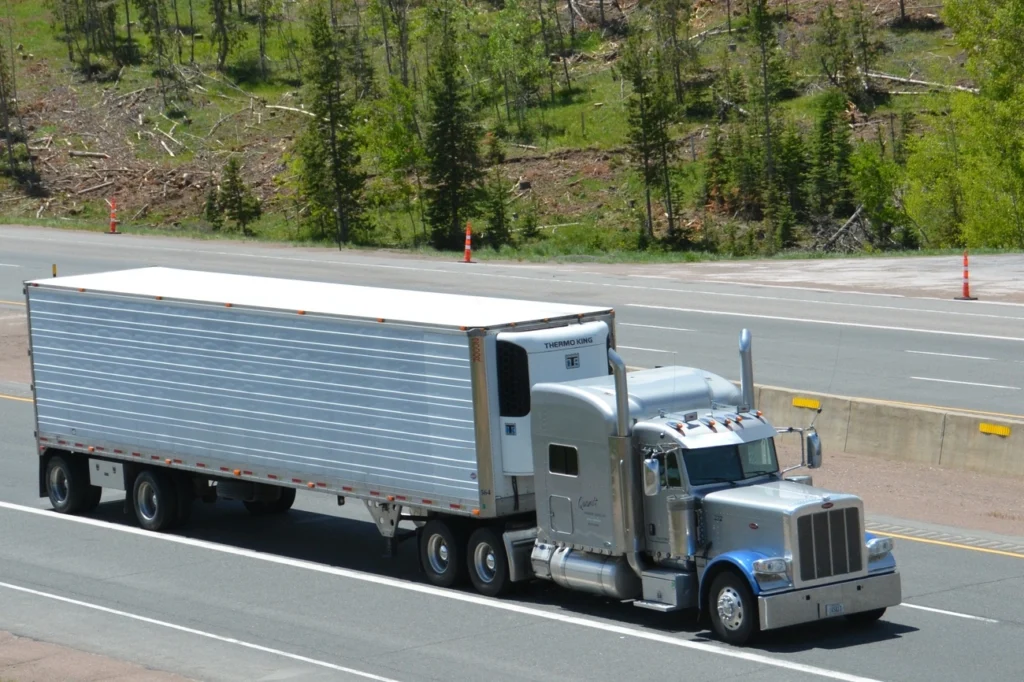Reefer trucking is an essential part of industries that require shipments of perishable or temperature-sensitive goods. Its importance is based on ensuring the proper condition of cargo as it reaches its destination. It’s beneficial in long-haul trucking.
To become successful in this sector, you should understand its specifics, related regulations, and have specialized skills. Whether you want to operate in reefer trucking as a truck driver, a fleet manager, or an owner-operator, the article will provide an overview of the sector, its specifics, benefits, and challenges.

What is Reefer Trucking?
Reefer or refrigerated trucking refers to the transportation of perishable or temperature-sensitive products. This involves the operation of specialized trucks equipped with refrigeration units. They allow maintaining a specific temperature, providing safe and efficient delivery. Usually, reefer trucking is used for transporting such goods, as food, certain chemicals, or pharmaceuticals.
The main function of reefer is to protect the load and prevent spoilage of the goods. These trucks offer different temperature levels depending on the type of cargo. For instance, frozen foods often require sub-zero temperatures, while dairy products may need to be kept cool but not frozen.
A reefer truck driver has the most responsible role in this process. They must ensure the truck and cargo safety, manage the refrigeration unit, and maintain the required temperature. It involves regular adjustments and constant control to ensure the proper functioning of the unit. In addition, refrigerated truck drivers have to face other technical challenges. This includes strict delivery schedules, precise temperature control, and readiness to handle potential issues.
How Reefer Trucks Work
The main part of a reefer truck is a refrigerating system. It works like a large refrigerator, including compressors, condensers, and evaporators. The unit controls the required system inside the trailer and is powered by the truck’s engine or a separate diesel generator.
The second option ensures the refrigeration unit works even when the truck is staying.
When a truck driver loads the cargo, they set the required temperature based on the type of transported freight. Then, it’s essential to monitor and adjust the temperature if necessary. Even minor temperature changes can comp affect the quality of the load.
The walls of the trailer are insulated to maintain the temperature. This prevents outside heat from entering and keeps the cold air inside. Some reefer trucks also have the function of heat. It’s useful for transporting loads that require above-zero temperature.
Benefits of Reefer Trucking
Refrigerated trucking is essential for supply chains in various industries, such as the pharmaceuticals and food sectors. The specialized trucks ensure safe, reliable, and efficient transportation of perishable items.
Here are some of the key benefits of reefer trucks:
- Safe shipping of temperature-sensitive cargo. The major benefit is the opportunity to ship perishable loads over long distances. Items like fresh products, seafood, or pharmaceuticals, must be kept at a certain temperature. A specialized system of reefer trucks maintains the required temperature regime.
- Cargo versatility. Refer trucks are suitable for a wide range of freight. This flexibility allows shipments of a wide range of goods from different businesses. For example, frozen foods require below-zero temperatures, while fresh flowers need to stay cool, but not frozen.
- Operation in all conditions. Reefer trucking is also able to operate in all weather conditions. Thus, it is a year-round solution for transporting goods. Whether it’s summer or winter, reefer trucks can provide the required temperature for the cargo.
- Extended market reach. Reefer trucking allows business to extend their market presence. With maintaining the required temperature during long hauls, refrigerated trucks ensure perishable items reach distant markets in proper condition.
- Better product shelf life. Ensuring the required temperature during shipments extends the shelf life of perishable goods. Reefer trucking meets this demand, helping to preserve products for longer.
- Regulations compliance. Industries that need temperature-sensitive goods face stricter regulations for the transportation and storage of the goods. Reefer trucking helps comply with these rules, providing the necessary temperature level during shipments. Thus, companies can be sure they meet legal requirements, avoid penalties, and maintain their reputation.
Challenges and Considerations
Reefer trucking involves not only benefits but a set of challenges as well. Knowing them can help prepare for the demands and potential issues during reefer transportation. High operating costs, strict temperature control, complex logistics – this and more require specific skills and proper planning to ensure successful delivery.
- High operating costs. Usually, reefer trucking is more required more costs compared to standard trucking operations. The refrigeration units require additional fuel or electricity, increasing the total consumption. Maintenance costs are also higher as the refrigeration systems needs regular inspections and maintenance for proper functioning.
- Strict temperature control. One of the main requirements of reefer trucking Is constant temperature control. Even a small deviation can affect the cargo, leading to financial losses. Reefer truck drivers must monitor the temperature and make adjustments if needed.
- Complex logistics. Refrigerated trucking often involves complex logistics. This includes a strict schedule amid the limited shelf life of the cargo. Any delay can harm the cargo quality. Truck drivers and fleet managers must plan routes carefully to ensure meeting the deadlines.
- Regulatory compliance. Refrigerated trucking involves stricter regulations and standards as it handles perishable items and food products. Usually, the requirements refer to handling, storage, and transportation of the goods. The aim is to ensure the items are safe for use or consumption. Regulatory compliance can be challenging, requiring staying informed on the changing laws and new strategies of the sector.
- Equipment maintenance. The reliability of the refrigerator is crucial. Any malfunctioning can lead to damage or a loss of the cargo. Thus, regular maintenance and inspections are necessary. However, equipment failures still may occur. Thus, reefer truck drivers must be well-prepared to handle such situations on the road.
- Driver expertise. Reefer truck drivers are required to have specific skills to manage the challenges of refrigerated trucking. This involves understanding operations, trouble resolution, and the temperature requirements for different cargo types.
Best Practices for Reefer Truck Drivers
Refrigerated trucking involves strict regulations that can add more challenges to this process. However, the right strategies can simplify the adherence process. You can use one of these practices to ensure safe and efficient transportation:
- Review the temperature needs. Before going on the road, understand the cargo temperature needs. Different items often require different temperature settings. This knowledge can help set the refrigeration unit correctly.
- Cool the trailer before loading. Always cool the trailer before loading. This prevents the temperature from rising and protects goods from spoiling.
- Allow air to circulate. Ensure air flows freely inside the trailer. This helps to maintain the temperature level.
- Monitors the temperature. While driving, regularly check the temperature. Most modern reefer trucks have systems for real-time monitoring. However, regular checks can help identify potential issues and address them early.
- Inspect the equipment regularly. Check out the equipment during shipping to ensure it’s working as needed. Inspect such things as hoses, belts, and refrigerant levels.
- Plan your route. The most important aspect of reefer trucking is reaching the destination on time. Plan your route to avoid traffic or bad roads that can slow you down.
- Keep the trailer clean. Ensure the trailer is clean to avoid spoilage of the cargo. Clean it before loading new items, including removing any debris and ensuring sanity of the interior.
- Communicate clearly. Being in touch with your dispatcher and customers is crucial. Let them know about delivery times and any issues that occurred on the road.
- Be prepared. Sometimes, even with careful strategies and planned routes, something can go wrong. You should be ready for emergencies, such as bad weather, delays, or equipment failures.
Comparing Reefer Trucking with Other Trucking Types
As reefer trucking refers to shipping perishable goods with strict temperature control, it can be not suitable for some freight types. Such trucks as dry van, step deck, and flatbed can be more suitable for specific items. Each type has its specific purpose and is suitable for different cargo types.
| Aspect | Reefer trucking | Dry Van Trucking | Step Deck Trucking | Flatbed Trucking |
|---|---|---|---|---|
| Purpose | Transporting temperature-sensitive and perishable goods | Transporting general, non-perishable goods | Transporting oversized or taller cargo | Transporting larger heavy or oddly shaped items |
| Trailer type | Enclosed, temperature-controlled trailer | Enclosed trailer, without temperature control | Open trailer with two deck levels | Open trailer |
| Cargo example | Food, pharmaceuticals, chemicals | Electronics, high-value items | Construction element, machinery | Building materials, large machinery |
| Temperature control | Has temperature control | No temperature control | No temperature control | No temperature control |
| Loading/Unloading | Usually loaded from the rear | Usually loaded from the rear | Can be loaded from the sides, rear, or top | Can be loaded from the sides, rear, or top |
Career Path and Opportunities in Reefer Trucking
The trucking sector provides a range of opportunities for various specialists. It’s a suitable choice to start a new career and increase earnings. Reefer trucking isn’t an exception. This offers a rewarding path with plenty of opportunities. Whether you’re starting this path or an experienced trucker wanting to change the specialization, refrigerated trucking can be a suitable choice. It provides a stable and dynamic environment for a successful career.
Starting a new career
Becoming a reefer truck driver offers various opportunities for your career path. To get started, you must obtain a commercial driver’s license (CDL), proper insurance, and permits to operate a reefer truck. It also requires unique skills of operating and maintaining refrigeration units. Some drivers move into reefer trucking from general trucking amid unique opportunities.
In addition to standard trucking kiss, you must:
- Monitor and adjust the temperature in the truck.
- Handle special loading and unloading tasks.
- Understand cargo-specific requirements.
Opportunities in Reefer Trucking
Reefer trucking offers several opportunities for growth in this section. In particular, the key paths are as follows:
- Gaining experience. Being a reefer truck driver, you can obtain specialized skills in handling temperature-sensitive cargo. This experience is valued in the industry and can provide new growth opportunities. In particular, you may obtain an opportunity to take on more challenging routes or handle high-value items.
- Moving into supervision. With experience and a strong track record, you can advance into supervisory or management roles. These positions involve overseeing a truck fleet, coordinating schedules, and ensuring smooth operations. This role offers the potential for increased earnings and the opportunity to influence the efficiency of trucking operations.
- Becoming an owner-operator. The other opportunity of being a reefer truck driver is becoming an owner-operator as you gain more experience. It involves operating your truck and expanding your fleet if needed. In this role, you have the freedom to choose routes, contracts, and rates.
- Specialized freight. With more experience, you can take off specialized reefer freight that requires extra care.
- Owner-operator opportunities. Experienced drivers may become owner-operators and run their businesses. It means they can set their rates with reliable delivery services.
Conclusion
Reefer trucking is an essential part of the logistics sector. It ensures safe and efficient shipment of perishable items. This sector presents unique opportunities, such as increased revenue or obtaining new skills. However, it also presents some challenges, including stricter regulations, the need to control temperature regularly, and higher maintenance costs.
You need to outline suitable strategies and thoughtful approach to reach success in this sector.
A career in refrigerating trucking can be rewarding and dynamic if you have suitable skills and knowledge.







